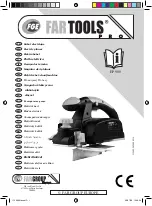
Anti-Kickback Fingers
Anti-kickback fingers help prevent stock from
being kicked out of the machine towards the
user. Keep the fingers clean and free from
sawdust, pitch gum, etc. so they operate
smoothly.
Adjustment of In-Feed Roller
The in-feed roller should be set 0.02” below the
lowest point of knife. Make sure the knives are
set properly see the “Setting / Changing Knives”
section on page 11 prior to making any
adjustments.
1. Disconnect machine from power source.
2. Place a hard wood gauge (A, Figure 14)
under a knife in cutterhead. Place a 0.02”
feeler gauge (B, Figure 14) on top of wood
block and raise table until feeler gauge
contacts the knife in its lowest position.
3. Remove feeler gauge and place wood block
under the left side of in-feed roller. The top
of wood gauge should just contact the in-
feed roller. If it doesn’t, loosen jam nut (C,
Figure 15) and turn the adjusting screw (D,
Figure 15) to raise, or lower the in-feed roller
until it contacts wood gauge. Repeat for
opposite side of the in-feed roller.
Adjustment of Chipbreaker
Chipbreaker should be set 0.02” below the
lowest point of knife. Make sure the knives are
set properly see the “Setting / Changing Knives”
section on page 11 prior to making any
adjustments.
1. Disconnect machine from power source.
2. Place a hard wood gauge (A, Figure 14)
under a knife in the cutterhead. Place a
0.02” feeler gauge (B, Figure 14) on top of
wood block and raise table until the gauge
contacts the knife in its lowest position.
3. Remove feeler gauge and place wood
gauge (E, Figure 16) under the left side of
chipbreaker (F, Figure 16). The top of the
wood gauge should just contact the
chipbreaker. If it doesn’t, remove the socket
head cap screw (G, Figure 15) and remove
washer (H, Figure 15), or replace with a
shim of proper thickness to raise, or lower
the chipbreaker until it contacts the wood
gauge. Repeat for opposite side of the
chipbreaker.
14















































